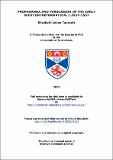Files in this item
Propaganda and persuasion in the early Scottish Reformation, c.1527-1557
Item metadata
| dc.contributor.advisor | Mason, Roger A. | |
| dc.contributor.author | Tapscott, Elizabeth L. | |
| dc.coverage.spatial | 249 | en_US |
| dc.date.accessioned | 2013-10-23T11:58:55Z | |
| dc.date.available | 2013-10-23T11:58:55Z | |
| dc.date.issued | 2013-11-30 | |
| dc.identifier.uri | https://hdl.handle.net/10023/4115 | |
| dc.description.abstract | The decades before the Scottish Reformation Parliament of 1560 witnessed the unprecedented use of a range of different media to disseminate the Protestant message and to shape beliefs and attitudes. By placing these works within their historical context, this thesis explores the ways in which various media – academic discourse, courtly entertainments, printed poetry, public performances, preaching and pedagogical tools – were employed by evangelical and Protestant reformers to persuade and/or educate different audiences within sixteenth-century Scottish society. The thematic approach examines not only how the reformist message was packaged, but how the movement itself and its persuasive agenda developed, revealing the ways in which it appealed to ever broader circles of Scottish society. In their efforts to bring about religious change, the reformers capitalised on a number of traditional media, while using different media to address different audiences. Hoping to initiate reform from within Church institutions, the reformers first addressed their appeals to the kingdom’s educated elite. When their attempts at reasoned academic discourse met with resistance, they turned their attention to the monarch, James V, and the royal court. Reformers within the court utilised courtly entertainments intended to amuse the royal circle and to influence the young king to oversee the reformation of religion within his realm. When, following James’s untimely death in 1542, the throne passed to his infant daughter, the reformers took advantage of the period of uncertainty that accompanied the minority. Through the relatively new technology of print, David Lindsay’s poetry and English propaganda presented the reformist message to audiences beyond the kingdom’s elite. Lindsay and other reformers also exploited the oral media of religious theatre in public spaces, while preaching was one of the most theologically significant, though under-researched, means of disseminating the reformist message. In addition to works intended to convert, the reformers also recognised the need for literature to edify the already converted. To this end, they produced pedagogical tools for use in individual and group devotions. Through the examination of these various media of persuasion, this study contributes to our understanding of the means by which reformed ideas were disseminated in Scotland, as well as the development of the reformist movement before 1560. | en_US |
| dc.language.iso | en | en_US |
| dc.publisher | University of St Andrews | |
| dc.rights | Creative Commons Attribution-NonCommercial-NoDerivs 3.0 Unported | |
| dc.rights.uri | http://creativecommons.org/licenses/by-nc-nd/3.0/ | |
| dc.subject | Scottish Reformation | en_US |
| dc.subject | Academic discourse | en_US |
| dc.subject | Courtly entertainments | en_US |
| dc.subject | Printing press | en_US |
| dc.subject | Public performance | en_US |
| dc.subject | Preaching | en_US |
| dc.subject | Pedagogical tools | en_US |
| dc.subject | Vernacular Bibles | en_US |
| dc.subject | Catechism | en_US |
| dc.subject | James V | en_US |
| dc.subject | Patrick Hamilton | en_US |
| dc.subject | Sir David Lindsay of the Mount | en_US |
| dc.subject | John Knox | en_US |
| dc.subject | George Wishart | en_US |
| dc.subject | Alexander Alesius | en_US |
| dc.subject | Murdoch Nisbet | en_US |
| dc.subject | The richt vay to the Kingdome of Heuien | en_US |
| dc.subject | George Buchanan | en_US |
| dc.subject | Godly fit | en_US |
| dc.subject | Rough wooings | en_US |
| dc.subject.lcc | BR385.T2 | |
| dc.subject.lcsh | Reformation--Scotland | en_US |
| dc.subject.lcsh | Propaganda--Scotland | en_US |
| dc.subject.lcsh | Christian literature, English--Protestant authors--History and criticism | en_US |
| dc.subject.lcsh | Christian education--Scotland--History--16th century | en_US |
| dc.subject.lcsh | Lindsay, David, Sir, fl. 1490-1555 | |
| dc.title | Propaganda and persuasion in the early Scottish Reformation, c.1527-1557 | en_US |
| dc.type | Thesis | en_US |
| dc.type.qualificationlevel | Doctoral | en_US |
| dc.type.qualificationname | PhD Doctor of Philosophy | en_US |
| dc.publisher.institution | The University of St Andrews | en_US |
| dc.publisher.department | Reformation Studies Institute and the Institute of Scottish Historical Research | en_US |
This item appears in the following Collection(s)
Except where otherwise noted within the work, this item's licence for re-use is described as Creative Commons Attribution-NonCommercial-NoDerivs 3.0 Unported
Items in the St Andrews Research Repository are protected by copyright, with all rights reserved, unless otherwise indicated.


